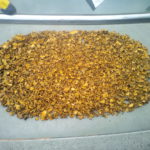
Oral submucous fibrosis is a chronic oral mucosal condition that is one of a group of oral potentially malignant disorders. It is primarily seen in South and East Asian countries although immigration now means that it is seen more widely. It is associated with the habit of areca nut chewing with malignant transformation rates of 7 – 13 % being reported. Studies demonstrating the effectiveness of curcumin in the management of oral submucous fibrosis have been conducted but there is some debate over its effectiveness.
The aim of this review was to evaluate the efficacy of curcumin in improving mouth opening (MO), burning sensation (BS), and tongue protrusion (TP) symptoms in patients with oral submucous fibrosis (OSF).
Methods
Searches were conducted in the Cochrane Library, PubMed, Embase, EBSCO, ProQuest, and Web of Science databases. Randomised controlled trials (RCTs) involving curcumin in the management of OSF were considered. Two reviewers independently selected studies extracted data and assessed risk of bias using the Cochrane tool. Outcome variables were analysed using mean difference (MD) or standardised mean difference (SMD), along with the 95% confidence interval (CI) and meta-analyses conducted.
Results
- 13 RCTs involving a total of 865 patients were included.
- 12 studies were conducted in India, one in Nepal.
- Patients ages range from 15 to 65 a majority being male.
- All 13 studies were considered to have some concerns, but none were at high or low risk of bias.
- 9 studies reported on mouth opening with random effects meta-analysis showing no significant improvement in curcumin groups compared to controls at 1, 2 3 or 6 months (see table below).
| Mouth Opening | No. of studies | SMD (95%CI) |
| I month | 8 | 0.03 (−0.56 to 0.62) |
| 2 months | 8 | −0.26 (−1.09 to 0.56) |
| 3 months | 8 | −0.28 (−1.20 to 0.65) |
| 6 months | 3 | 0.36 (−0.15 to 0.87) |
- 9 studies reported on burning sensation with results showing no significant difference in BS reduction between the curcumin and control groups after 1, 2 3 or 6 months (see table below).
| Burning sensation | No. of studies | SMD (95%CI) |
| I month | 7 | −0.64 (−1.27 to 0.00) |
| 2 months | 7 | 0.31 ( −0.98 to 1.59) |
| 3 months | 7 | −0.56 (−1.27 to 0.16) |
| 6 months | 3 | −0.60 (−2.63 to 1.43) |
- 7 studies reported on tongue protrusion with random effects meta-analysis showing no significant improvement in curcumin groups compared to controls at 1, 2 or 3 months (see table below).
| Tongue protrusion | No. of studies | SMD (95%CI) |
| I month | 9 | 0.15 (−0.15 to 0.45) |
| 2 months | 9 | 0.43 (−0.04 to 0.90) |
| 3 months | 5 | 0.92 (−0.29 to 2.14) |
Conclusions
The authors concluded: –
…….curcumin may have potential in improving mouth opening, alleviating oral burning sensation, and improving tongue protrusion in patients with oral submucous fibrosis. The findings from individual studies suggest that curcumin may be more effective than placebo in reducing burning sensation in oral submucous fibrosis patients. With the RCTs included, it was not possible to demonstrate a significant difference in therapeutic efficacy between topical or oral administration of curcumin and control medications in these patients. The above results may be attributed to the small sample size and significant heterogeneity. Therefore, more multi- centre RCTs are warranted to further verify the specific therapeutic effects of curcumin on mouth opening, burning sensation, and tongue protrusion in patients with oral submucous fibrosis. Additional research should aim to determine optimal protocols for curcumin formulation, route of administration, and duration of application in oral submucous fibrosis to maximize the treatment benefits.
Comments
The authors have searched a good range of databases with key elements of the review being undertaken independently and in duplicate. However, no protocol was registered. We looked at an earlier review of this topic by Al-Maweri (Dental Elf – 6th Mar 2019) which included 6 RCTs of which 5 are included in this review. It is interesting to note that Al-Maweri rated four of the 5 studies included in this new review as being at high risk of bias rather than being of some concern as the authors of this review have.
The main meta-analysis for mouth opening, burning sensation, and improving tongue protrusion all demonstrate no significant difference between curcumin and controls. The authors do however highlight a small number of studies that did demonstrate significant differences. But as the authors point out the included studies are small which needs to be taken into consideration as does the variability across the format in which the curcumin was delivered (capsules, tablets, lozenges, mouthwash, gels or oil). While there is a need for additional studies these need to be well-conducted and reported RCTs of appropriate size and duration of treatments for OSF preferably using agreed common outcome frameworks. There is also a need for clear reporting of clinical staging of OSF and adverse events.
Links
Primary Paper
Shao Y, Miao J, Wang Y. Curcumin in the treatment of oral submucous fibrosis: a systematic review and meta-analysis of randomized controlled trials. Int J Oral Maxillofac Surg. 2023 Dec 5:S0901-5027(23)00880-9. doi: 10.1016/j.ijom.2023.11.005. Epub ahead of print. PMID: 38057194.
Other references
Dental Elf – 6th Mar 2019
Picture Credits
